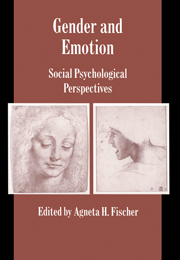Book contents
- Frontmatter
- Contents
- Preface
- Contributors
- Part I Culture, gender, and emotional beliefs
- 1 Thinking about gender, thinking about theory: Gender and emotional experience
- 2 The socialization of gender differences in emotional expression: Display rules, infant temperament, and differentiation
- 3 Men's and women's lay theories of emotion
- 4 The relation between gender and emotion in different cultures
- Part II Emotion expression and communication
- Part III Distinct emotions
- Part IV Epilogue
- Indexes
- Studies in Emotion and Social Interaction
1 - Thinking about gender, thinking about theory: Gender and emotional experience
Published online by Cambridge University Press: 20 January 2010
- Frontmatter
- Contents
- Preface
- Contributors
- Part I Culture, gender, and emotional beliefs
- 1 Thinking about gender, thinking about theory: Gender and emotional experience
- 2 The socialization of gender differences in emotional expression: Display rules, infant temperament, and differentiation
- 3 Men's and women's lay theories of emotion
- 4 The relation between gender and emotion in different cultures
- Part II Emotion expression and communication
- Part III Distinct emotions
- Part IV Epilogue
- Indexes
- Studies in Emotion and Social Interaction
Summary
In 1996 the US Supreme Court ruled on a case concerning the Virginia Military Institute (VMI), a state-supported public college. The college had admitted only male students since its nineteenth-century founding, and was resisting pressure to become co-educational. A legal challenge to sex-segregation ensued, and the arguments made by the defendant's side are particularly pertinent to the study of emotion. The case was hotly debated and watched across the country, in part because the institution is very prestigious within the state of Virginia, and the networks of power in that state include many VMI alumni. The record of arguments to sustain publicly supported sex discrimination in access to study is replete with sex stereotypes, and a generous portion of those arguments hinge on generalizations about emotion. According to reports in the Chronicle of Higher Education, witnesses for Virginia testified in the lower courts that VMI “was not suitable for most women, because, compared with men, women are more emotional, less aggressive, suffer more from fear of failure, and cannot withstand stress as well” (Greenberger & Blake, 1996, p. A52). The sweeping generalizations about the emotions of women, evident in witness statements and amicus curiae briefs, are illustrated in the testimony of one educator who confidently concluded that “women are not capable of the ferocity requisite to make the program work, and they are also not capable of enduring without … psychological trauma” (Greenberger & Blake, 1996, p. A52). Fears of women's emotions running amok notwithstanding, the court ruled against VMI and in favor of the admission of women.
- Type
- Chapter
- Information
- Gender and EmotionSocial Psychological Perspectives, pp. 3 - 23Publisher: Cambridge University PressPrint publication year: 2000
- 46
- Cited by

